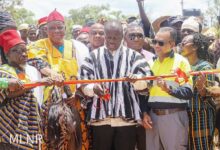
Stakeholders at this year’s International Women’s Day celebration held at Tongo in the Talensi District of the Upper East Region have underscored the need for government to formulate gender-balanced programmes and policies to help address the numerous challenges confronting women in the country.
The event organised by ActionAid Ghana (AAG), a non-governmental organisation (NGO), on the theme, ‘Think equal, build smart, innovate for change: to reduce the burden of care on women and girls in Ghana’, brought together rural women, traditional rulers, heads of government institutions and stakeholders in gender across the region.
They said unless this was done, it would be difficult for women to contribute their quota significantly to national development and help achieve the sustainable development goals (SDGs).
The stakeholders challenged the Ministry of Gender, Children and Social Protection, and the Ministry of Local Government and Rural Development to take proactive interventions that would help do away with gender disparities, and empower women and girls to be critical contributors to national development.
They said the current development did not favour gender equality, especially with regards to the issue of unpaid work and representation of women in decision making process, among others, and called for positive change.
The women stated that they were not asking their husbands to pay them for the work they do at home, but they were advocating men to participate in household chores to enable them (women) to venture into other income generating activities to support the families.
The stakeholders who also called for the abolishment of outmoded cultural practices and beliefs that downgraded woman, stressed the need for boys to be involved in the household chores to help bridge the gender disparity.
The Programmes Manager of AAG in charge of Upper East, Sulemana Alhassan, stated that the contributions of women to national development could not be overemphasised.
But for the socio-cultural barriers and discrimination facing women, he said the women could have been contributing more to the growth of the country.
Mr Alhassan told the stakeholders that society was dynamic, therefore, they should form synergies that would lead to the empowerment of women and reduce the burden of unpaid care work through the provision of infrastructure and services like water facilities and early childhood development centres.
The Upper East Regional Minister, Ms Paulina Patience Abayage, explained that the prevailing gender norms and beliefs have subjected many women to bulk of unpaid care work and denies them of the opportunity to be empowered socially, economically and politically to enjoy dignified lives.
She said for the country to be able to make significant gains in the attainment of the SDGs, especially SDG 5 by 2030, it was very important for all stakeholders to endeavour to work hard to advance the course of gender equality, so as to influence critical services and adequate budgetary allocations for concerned institutions to help reduce the burden on women.
The International Women’s Day, celebrated globally on March 8 each year, is to reflect and recognise the contributions of women in attaining social, cultural, economic and political advancements, leading to the general well-being of families, communities and the nation as well as advocate opportunities for the empowerment of rural women.
FROM SAMUEL AKAPULE, TONGO






